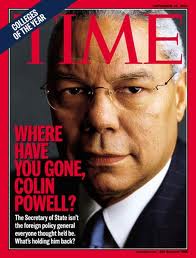
Will Colin Powell become Barack Obama's next Pentagon chief?
Toby Harnden, The Telegraph UK
4 December 2010
– – – – – – –
Obama's most important decision you haven't heard about — Pentagon leaders
Richard H. Kohn, Christian Science Monitor
6 December 2010
Breaking Down Obama's Cabinet Contenders (2008)
Brian Montopoli, CBSNews
6 November 2008
Phi Beta Iota: The most important decision Barack Obama faces is the fundamental one of whether he wants to lead a government that works for all, or continue to be a meaningless placeholder in the theater of the absurd. Electoral Reform is the only thing that matters at this point. Absent Electoral Reform, his mid-term Cabinet appointments will be meaningless–business as usual. Colin Powell is as good as it gets if he can reframe his sense of loyalty back to the Constitutional Oath and actually down-size the Pentagon program by a third or more, while shifting $200 billion a year to State, where Senator Chuck Hagel would be well qualified to get the place back to evidence-based policies and coherent strategic planning. Commerce is a big one–Clyde Prestowitz would be our recommendation, along with Joseph Stiglitz to Office of Management and Budget–see our Virtual Cabinet at Huffington Post. However stellar the appointments, nothing they do will matter absent fundamental Electoral Reform and a restoration of the integrity not only of the US executive policy process, but of the legislative deliberation process as well. Only Electoral Reform can create an honest representative Congress. There are many other critical changes to be made at the highest levels, but ONLY in the context of a restoration of the government being Of, By, and For We the People. Obama is one single piece of paper away from greatness. We observe with interest.





